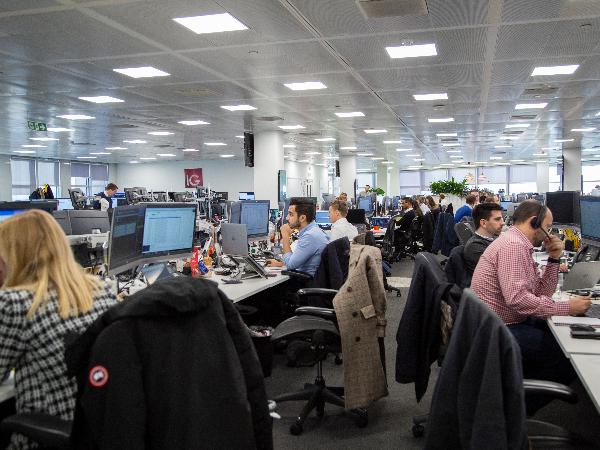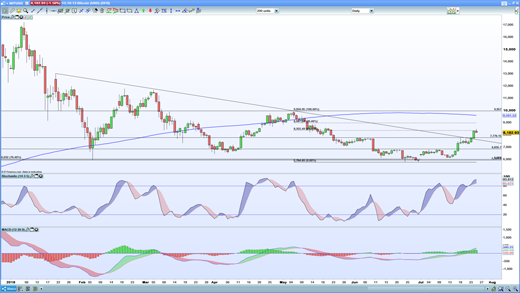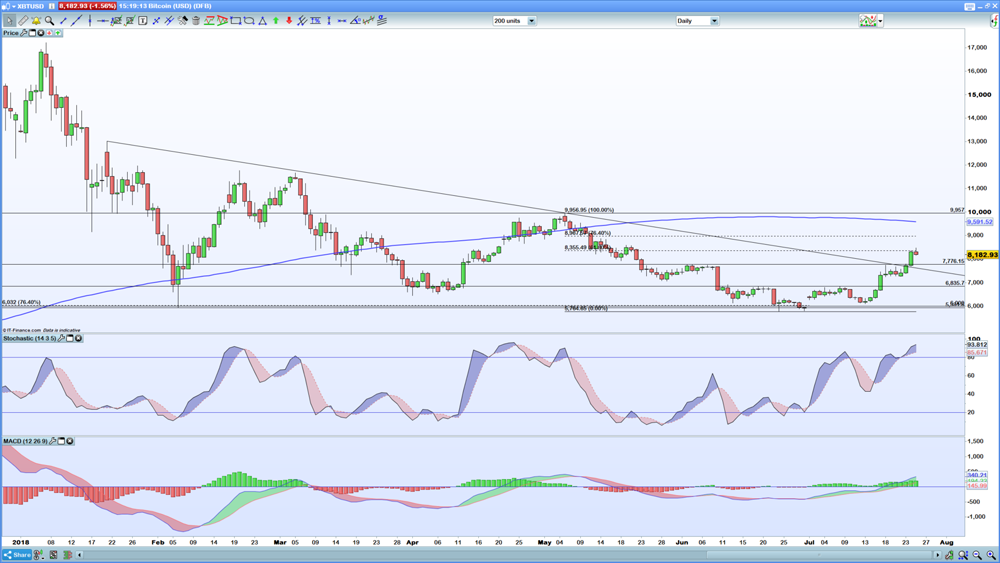BTC
- by zoltan tompa
- 5 posts
-
Thanks to Blockchain Technology, the Entrepreneurial Spirit in France Has Never ... (entrepreneur.com)Opinions expressed by Entrepreneur contributors are their own.If you were to visit France just a few years ago to explore the startup environment, sadly, you would have been pretty disappointed.
However, if you were to come back today, you would be filled with surprise to learn just how much the landscape has changed.
Related: Why You Need to Be Paying Attention to the French Tech SceneAlthough France isn't currently considered the main hub for blockchain innovation in Europe, it is certainly one of the fastest growing, as I can personally attest.Historically and culturally in France, failure was never embraced.
In the U.S., entrepreneurs who fail to build successful businesses are perceived as bold, knowledgeable and ambitious, just from having attempted the journey. They learn valuable lessons from their experiences, lessons that can be applied to future endeavors that can heighten their possibilities of success. Even the most successful entrepreneurs have failed several times before they got their first taste of success.
In French culture, failure has historically been associated with shame, and entrepreneurs are often very reluctant, if not terrified, to take that pivotal leap of faith to initiate their journey. In their defense, startups have a very low success rate, which can lead to a decline in the emergence of new startups.
French business owners believe that if they fail, that can potentially mean the end of their career, as no investor will trust this "failure of an entrepreneur" with his or her money ever again. The French government did not make the situation any easier either, because to bankruptcy usually meant that you would never be able to own anything of value ever again, or at least for a very long time.
Related: We Need to Change How We Think About Failure in EuropeLuckily, mindsets have been changing over time.
The perception of failure in French society has recently shifted and we are seeing a sharp spike in the amount of startups that are springing to life, especially those that are exploring blockchain technology innovations. This stems from some of the new French laws that President Macron has put in place to lift the French entrepreneurial spirit.
This major change is due to the French government shifting its stance on blockchain technology and cryptocurrencies to one of support and optimism. It envisions a future that inevitably involves blockchain technology handling various processes of our daily lives, and it wants to become one of the countries leading the charge.
In fact, the French government is allegedly taking steps to work on a legislative framework for initial coin offerings, or ICOs (the first of its kind) and has even slashed the cryptocurrency tax rate.
Earlier this month, Chain Accelerator -- the leading blockchain startup accelerator in the EU -- launched in Station F in Paris. Progress is happening right before our very eyes.Related: Switzerland's 'Crypto Valley' Presents Real Opportunities for Blockchain EntrepreneursFrench policy concerning blockchain technology is evolving.
Starting in 2016, President Macron, former Minister of the Economy, Industry and Digital, began to pave the way for the use of blockchain technology for crowdfunding."We are going to take advantage of the Financial Regulation Ordinance, which is responsible for updating cash certificates and creating mini-cash, to experiment on the blockchain," Macron said.
However, for such an experiment to be possible, it will be necessary to modify some components such as the central depository that has been established for listed securities. Cash vouchers will serve as backing for the blockchain.
If successful, the government could extend the scope of this blockchain to unlisted securities "to promote the emergence of a stock market for small and medium enterprises" and potentially on listed stock exchanges, such as the Paris Bourse."This is a first in Europe," Macron said.
The Cabinet adopted an ordinance in 2017 that facilitates the transfer of ownership of certain financial securities using blockchain storage and information technology, functioning as a large decentralized digital registry (distributed ledger technology or DLT), reputed to be unfalsifiable.
This order clarifies the terms and conditions for payment of dematerialized financial securities via a "shared electronic recording device." thus securing the use of blockchain for the transmission of non-electronic securities.The order is expected to come into effect no later than July 2018.
"The use of this technology will allow fintech and other financial players to offer new solutions for securities trading -- faster, cheaper, more transparent and more secure solutions," said the French Minister of Economy and Finance, Bruno Le Maire.
Related: Which European Countries Are Best for Cryptocurrency Startups?Blockchain has helped entrepreneurship gain traction.
Unlike some of my colleagues, I have always associated risk with opportunity. That is why in 2009, after completing my master degree, I started what became DOZ.com, a digital marketing software and marketplace.
Now with the emergence of blockchain technology and ICOs, many French individuals are starting to take their owns leaps of faith into starting their own businesses or working for startups that they believe in.
It is actually quite dramatic how quickly these changes have taken place, as I believe this movement started gaining traction just one year ago, maybe even less.
At the beginning of this year, I co-founded the blockchain startup Varanida, a solution to some of the deficiencies that currently exist in the digital advertising industry.
Given my background and experience in the digital advertising industry, I can almost state with certainty that with a growing digital economy, a blockchain-based advertising model will become the norm for digital marketing.
Although we, the French, have always considered ourselves a very ambitious people, a new sense of boldness and entrepreneurial spirit is flooding the streets that I grew up in, and I'm glad to not only be a witness, but also a pioneer.-
By
 Admin
Admin - 0 comments
- 3 likes
- Like
- Share
-
By
-
Who’s using Bitcoin to buy and sell goods and services?A lot fewer people than you probably would have guessed.
After peaking at $411 million in September, the amount of money the largest 17 crypto merchant-processing services received in the best-known cryptocurrency has been on a steady decline, hitting a recent low of $60 million in May, according to research that startup Chainalysis Inc. conducted for Bloomberg News.
While the amount merchant services such as BitPay, Coinify and GoCoin received increased slightly in June to $69 million, it was still a far cry from the $270 million received a year ago, Chainalysis found.
Bitcoin advocates have long suggested the virtual money would one day replace fiat currencies as a means of doing business, but after a rise in use last fall, the cryptocurrency has lost what little appeal it had as a way to buy goods or services.
“It’s not actually usable,” Nicholas Weaver, a senior researcher at the International Computer Science Institute, said in an email. Often, he said, “the net cost of a Bitcoin transaction is far more than a credit card transaction.” And Bitcoin-based transactions can’t be reversed, an issue when a merchant or a consumer comes up against fraud.
The decline in use for payments coincided with the spike in speculative investing that drove the price of the biggest virtual currency to a record high of almost $20,000 in December.
While Bitcoin’s price has steadied somewhat recently after crashing more than 50 percent, consumers still appear to be reluctant to use the digital coins for transactions.“When the price is going up so rapidly last year, in one day you could lose $1,000 if you spent it,” Kim Grauer, senior economist at Chainalysis, said in a phone interview.
What’s more, high transaction fees have made paying for small-ticket items like coffee with Bitcoin impractical, she said.In January, payment service Stripe Inc. stopped supporting Bitcoin as usage declined and price swings intensified. A number of companies such as travel services provider Expedia stopped accepting the cryptocurrency as well.
That’s a troubling sign for some fundamental investors, who maintain the belief that the cryptocurrency has to be in use in the real world versus just be a speculative instrument to have long-term value.
“Most people who are not Bitcoin core maximalists argue that yes, you need people to use these things as means of payment to become money,” Kyle Samani, managing partner at Austin, Texas-based hedge fund Multicoin Capital, said in a email.
“Or as my co-founder Tushar likes to say, don’t think of money as a noun, but rather as an adjective. The more something is used as money, the more ‘moneyness’ it has.
”The way Bitcoin is being utilized is changing as well. Because the fees to process a transaction in Bitcoin can be steep and varied — they peaked at $54 in December, but are down to less than $1 today — not many people are using the coins for small transactions, like buying a cup of coffee.
They are spending the virtual currency more to pay vendors like freelancers located overseas: For those cases, using Bitcoin can be cheaper and faster than using traditional financial services.
“In the last six months we’ve seen a large uptick in crypto companies paying their vendors in Bitcoin, including law firms, hosting companies, accounting firms, landlords and software vendors,” according to Sonny Singh, chief commercial officer of processor BitPay.
His company has seen a five-fold increase in crypto companies paying their bills from last year, he said.Bitcoin faithful continue to buy bigger-ticket items such as furniture, and still the occasional sports car. At Overstock.com Inc., crypto-based sales are up two-fold in the first half of this year versus a year ago, the company said.
Top items bought with cryptocurrency include living-room furniture, bedroom furniture and laptops, according to the site. Many people, however, are only speculating with Bitcoin or selling off small amounts to convert it into a fiat currency, and use that to pay for goods and services.
Long-time advocate Graham Tonkin said he converts his Bitcoin and Ether from time to time to cover credit-card bills. “I assume many people are like me, where you won’t be doing your everyday transactions in it,” said Tonkin, who is chief growth officer at crypto finance research company Mosaic.
“I don’t believe [it] fits the characteristics of money very well.”

Now read: Binance to purchase cryptocurrency wallet company
-
By
 Admin
Admin - 0 comments
- 3 likes
- Like
- Share
-
By
-
Ripple Chief Market Strategist Cory Johnson on the future of blockchain and cryptocurrency.
-
By
 Admin
Admin - 0 comments
- 4 likes
- Like
- Share
-
By
-
Fast Money trader Brian Kelly explains why he believes the bitcoin rally is for real. With CNBC's Melissa Lee and the Futures Now traders, Tim Seymour, Steve Grasso and Guy Adami.
-
Francisco Gimeno - BC Analyst Bitcoin prices, ETF, etc, is the new hype again. It is good to get informed but I would not act over these news if I were in crypto trade. HODL and let the speculation o on and off, watch how institutions move and be informed, separating fake news from real ones.
-
-
Bitcoin has been rallying sharply over the past two weeks, gaining around 40% from the $6000 mark. However, with the creation of lower highs throughout 2018, there is a risk that we will see another turn lower in the near future.

Joshua Mahony JMahony_IG
Market Analyst
Source: Bloomberg
Bitcoin has been on the rise over the past fortnight, with the price pushing through trendline resistance to reach the 61.8% retracement. That rally through the trendline certainly signals a slowdown in the decline of the cryptocurrency, yet the question over whether this marks the bottom remains to be answered.
The downtrend that has been in place throughout 2018 remains, despite this trendline break, yet it is clear that the rally through $7776 paved the way for a short-term period of upside.
The daily chart highlights that we have seen a substantial amount of support at $6000 throughout this year-to-date. Thus it was no major surprise that the price of bitcoin managed to reverse higher from that level, driving a 41% gain from the June lows.

Now that we have seen the price push into the 61.8% retracement, the trend of lower highs has a chance of coming back into play once more. There is a chance that we could see a deeper retracement into the 76.4% level ($8967), but there is also a chance that we will see the price continue upwards and through $9956.
Such a break above that early-May swing high would spark a bullish wider view for bitcoin. Until then, the trend of lower highs and flatlining lows (descending triangle) remains in play, and therefore there is a possibility we could start seeing selling come back into play before long.Interested in trading other cryptocurrencies?
We want to know which crypto asset you are most interested in for our IG Community poll. Have your say and help shape the future of IG.-
By
 Admin
Admin - 0 comments
- 3 likes
- Like
- Share
-
By






